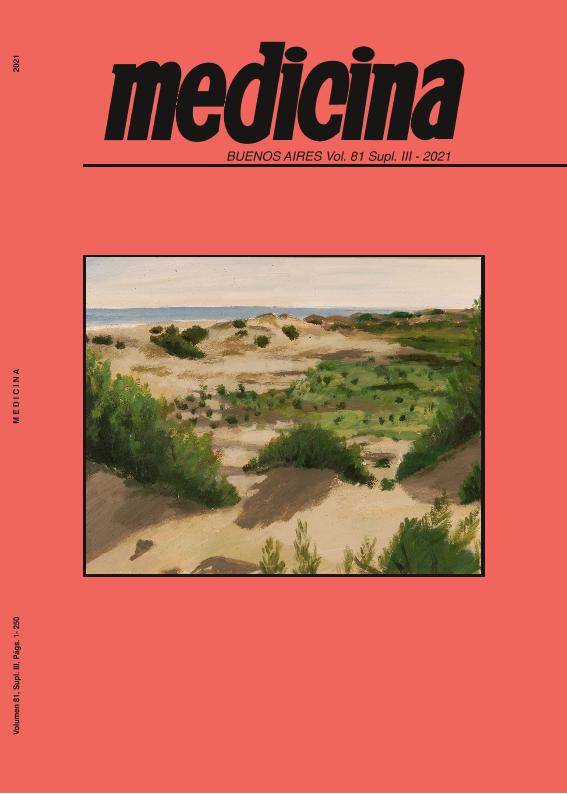Evento
Inhibition of bacterial adherence to vascular catheter of the antimicrobial peptide AP7121
Schofs, Laureano ; Lissarrague, Sabina; Baldaccini, Maria Beatriz; García Allende, Leandro; de Yaniz, María Guadalupe
; Lissarrague, Sabina; Baldaccini, Maria Beatriz; García Allende, Leandro; de Yaniz, María Guadalupe ; Sanchez Bruni, Sergio Fabian
; Sanchez Bruni, Sergio Fabian ; Sparo, Mónica Delfina
; Sparo, Mónica Delfina
 ; Lissarrague, Sabina; Baldaccini, Maria Beatriz; García Allende, Leandro; de Yaniz, María Guadalupe
; Lissarrague, Sabina; Baldaccini, Maria Beatriz; García Allende, Leandro; de Yaniz, María Guadalupe ; Sanchez Bruni, Sergio Fabian
; Sanchez Bruni, Sergio Fabian ; Sparo, Mónica Delfina
; Sparo, Mónica Delfina
Tipo del evento:
Reunión
Nombre del evento:
LXVI Reunión Anual de La Sociedad Argentina de Investigación Clínica: LXIX Reunión Anual de La Sociedad Argentina de Inmunología; LIII Reunión Anual de La Asociación Argentina de Farmacología Experimental y XI Reunión Anual de La Asociación Argentina De Nanomedicinas
Fecha del evento:
17/11/2021
Institución Organizadora:
Sociedad Argentina de Investigación Clínica;
Sociedad Argentina de Virología;
Sociedad Argentina de Biología;
Sociedad Argentina de Protozoología;
Asociación Argentina de Nanomedicinas;
Asociación Argentina de Ciencia y Tecnología de Animales de Laboratorio;
Título de la revista:
Medicina (Buenos Aires)
Editorial:
Fundación Revista Medicina
ISSN:
1669-9106
Idioma:
Inglés
Clasificación temática:
Resumen
Healthcare-associated bloodstream infections are the leading cause of morbidity and mortality in hospitalized patients. Vascular catheter-related infection is its main source. Gram-positive bacteria specially Staphylococcus spp., are the most prevalent etiological agents. Bacterial adherence is the starting point of colonization of a surface known as biofilm development. The inhibition of this process is the primary strategy to prevent bacteremia related to medical devices. The aim of this work was to assess the inhibitory activity of the antimicrobial peptide AP7121 on the Staphylococcus aureus adherence in vascular catheters. The biofilm-producer strain Staphylococcus aureus ATCC 35556 (SA) was used. First, The MIC of AP7121 (MICAP) for SA was estimated. Upon, 20 mm segments of vascular catheter (n=3) were inoculated with 104 CFU/mL of SA. Three different treatment schemes (A: simultaneous, B: previous and C: following bacterial challenge) using 1 x MICAP were tested. Control groups were included in each scheme. Statistical analysis was made using ANOVA and Kruskal-Wallis test (p <0.05 was considered statistically significant). The MICAP was 0.48 mg/L. A significant bacterial reduction (p < 0.001) of 2 logarithms representing a decrease of 99% of viable SA cells was achieved with schemes A and B. The post-challenge treatment with AP7121 (scheme C) produced a significant reduction (p < 0.01) of 1 logarithm representing a decrease of 90% of viable SA cells. The results observed in this work suggest a fast antimicrobial activity of AP7121 that could be beneficial to reduce bacterial adherence on medical devices such as vascular catheter and potential decreasing bloodstream infections -associated. In vivo studies are needed to establish the feasibility of this proposal.
Palabras clave:
Antimicrobial peptides
,
AP7121
,
Staphylococcus aureus
,
Vascular catheter
Archivos asociados
Licencia
Identificadores
Colecciones
Eventos(CIVETAN)
Eventos de CENTRO DE INVESTIGACION VETERINARIA DE TANDIL
Eventos de CENTRO DE INVESTIGACION VETERINARIA DE TANDIL
Citación
Inhibition of bacterial adherence to vascular catheter of the antimicrobial peptide AP7121; LXVI Reunión Anual de La Sociedad Argentina de Investigación Clínica: LXIX Reunión Anual de La Sociedad Argentina de Inmunología; LIII Reunión Anual de La Asociación Argentina de Farmacología Experimental y XI Reunión Anual de La Asociación Argentina De Nanomedicinas; Buenos Aires; Argentina; 2021; 70-70
Compartir



